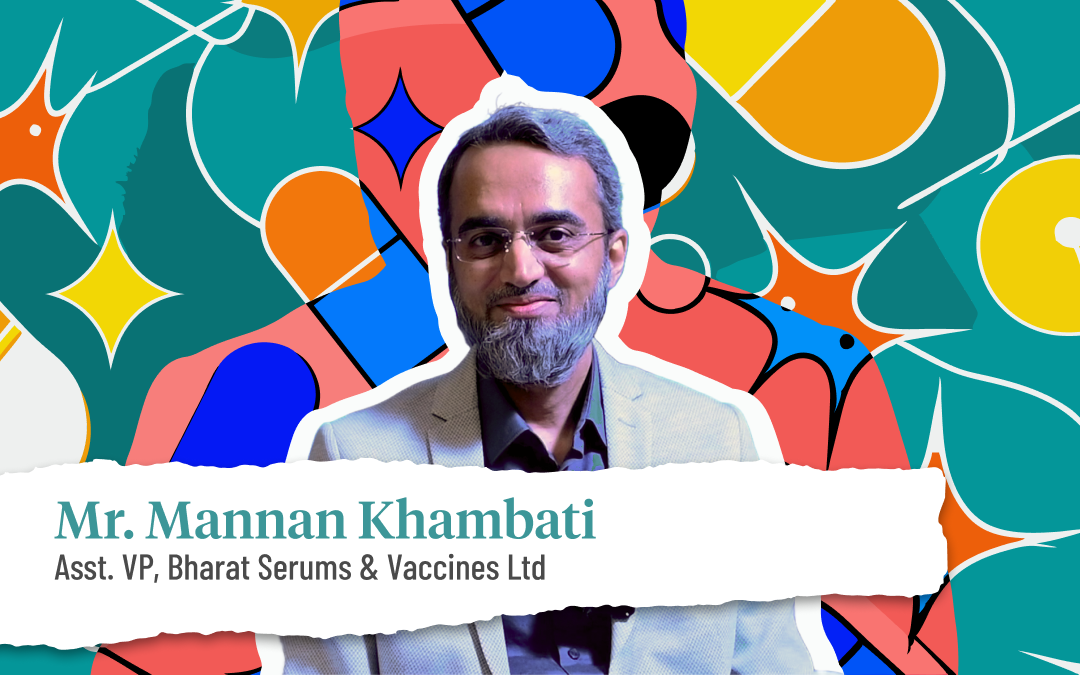QnA
Interview | May 31, 2025
Dr. Pramod Kumar Rajput is a seasoned pharmaceutical leader with over four decades of experience, known for driving business excellence, mentoring professionals, and shaping the pharma ecosystem. Formerly Sr. Vice President and Vertical Head at Cadila Pharmaceuticals, he has demonstrated mastery in steering domestic and international operations, revitalizing business units, and fostering innovation. As an author, keynote speaker, educator, and mentor, Dr. Rajput combines academic rigor (holding a Ph.D. and multiple honorary doctorates) with practical wisdom to inspire leaders, guide transformations, and champion the ethos of lifelong learning and strategic impact.
Pharma Now: Welcome to Pharma Now, Dr Pramod. It's an honour and privilege to discuss with you on a lot of aspects of leadership and your experience, which spans up to four decades in the industry. You have coached nearly 55,000 professionals throughout your career. Could you please let us know the purpose behind doing leadership coaching?
Dr PK Rajput: Thanks a lot for inviting me into this conversation. This is a brilliant question because when we started our careers, we didn’t have the right leaders to guide us. Today, the scenario is changing because the new generation has a lot of aspirations. They want to achieve something, so it is important to ensure the right pinpoint which we can provide to them and the right way of building leadership in their mind. So if you can nurture them towards the right perspective, they are going to shine for Bharat in the entire world. This is the vision of our respected Prime Minister and everyone else. Currently, 69% of the top senior leaders in various global companies are Indians, and this number may surge up to 90% in the coming years. The young generation coming up with such a great mindset needs nurturing to become the right kind of leaders.
Pharma Now: Your thoughts are really amazing. As India is becoming the Pharmacy of the World, it is rapidly growing in India, everyone is choosing pharma as their career path. The opportunities to enter this industry have skyrocketed, especially after the COVID period. The work that you are doing by training all the professionals to step up the ladder is a laudable contribution to the industry.
Now, let’s go back to the past. I would like to start with your journey, which started from a small town in Gorakhpur. Could you tell me more about how you started your career?
Dr PK Rajput: This question makes me feel nostalgic. After completing my graduation, I was selected in the engineering college because I was a person from a math and science background and not from biology. Because at that time, there were only two streams, viz. PCB and PCM. So there, I spent two years pursuing BSc, unlike the usual three years. After getting my selection in the engineering college, within 45 days, I was unable to acquaint myself well. Although throughout the years of time I've studied mathematics and science, at the same time, something kept coming to my mind that the pharmaceutical professionals who communicate with doctors and sell the medicines alleviate human suffering. Watching that, I wanted to be a part of this journey, and it triggered something in my mind. And then, without knowing anything, I thought of giving an interview. But of course, I used to read a lot from the competition success magazine, which helped me prepare to give the interview. So that gave me an edge in the interview. After the interview, I eventually got selected and joined Cadila in 1982. Throughout my basic journey as a medical representative, I thrived and got a promotion. I was the youngest guy who got a promotion as the area manager, then regional manager and business development manager. In that way, I got the complete promotion. I was able to build the team because till the time you work as a medical representative, you have to work by yourself, but when you become a manager, you have to ensure that your team is successful. That part has come under the leadership area, because a real leader is not someone who drives alone; he also lets the team drive, so that he becomes a successful person along with the team.
In 2001, when I switched to the head office from the field work, things were different because the head office culture is equivalent to corporate culture. In the field, you are taking care of everything, but in the head office, you have to deal with everybody. So then I started to understand the importance of competition and coordination. If you compete alone, you will have fewer chances of being successful. But in the head office, you ought to have collaboration, and the blend of collaboration and competition will make you more successful. In that way, you'll be able to learn the strength of other people and, concurrently, you'll be able to strengthen yourself and eliminate your negative points as well.
When I was at the helm of affairs at Cadila, I was taking care of multiple divisions as well as the vertical head and over a period of time, I’ve noticed that many members of the new generation are entering the workforce. There’s a common discussion about how they don’t want to stay long in one job, as they leave after just a year or two. I studied this phenomenon deeply to understand why they’re leaving. I even conducted interviews to ask directly: "Why do you leave your jobs so quickly?" I found that they have very high aspirations. But in order to fulfill those aspirations, they need proper handholding. Unfortunately, in most running organizations, people don’t have the time to fully mentor or support them. These young professionals often come from good institutes and are well-versed in basic knowledge, but they lack the actual skills required in the workplace. That’s why we keep talking about the need for industry-academia collaboration.
Beyond technical knowledge, what really matters are the soft skills—how to deal with people, how to show empathy, how to respect others, and how to communicate effectively. These soft skills are extremely important. If we can help them build these soft skills and continuously inspire them in the right direction, they are more than willing to work hard. I always say that people think the grass is greener on the other side, but I believe it depends on you, as the gardener, how much you water your own grass to make it green.
Pharma Now: Yes, I certainly agree. The young generation is truly looking for mentorship and a guided leadership path. In today’s digital world, with Instagram Reels and YouTube Shorts, they’re constantly consuming content that shows people clinching 50–70 lakh salary packages. That’s when they start getting distracted. If we can provide them with strong leadership and meaningful mentorship, we can manage attrition more effectively.
Dr PK Rajput: Absolutely, and I always say, if you want to achieve something, put your best foot forward. Don’t just chase money early in your career. Focus on building your career first, and the money will follow. It’s like the old saying: if you want to cut a tree, sharpen your axe for 9 hours and cut it in 1 hour. But if you start chasing only money from the beginning, you’ll end up being a rolling stone. I’ve seen people jump companies and get great salary hikes, but after 10 years, they find themselves stuck. They become hollow. You shouldn’t be hollow, you need to be solid. A solid person can take on any challenge because they’ve faced challenges before and can handle them with a smile.
Pharma Now: Certainly. So, Dr Pramod, you started your career in a small area as an MR, and eventually, you were handling sales and marketing in 25 countries. That’s a huge leap into leadership. I’d love to understand your journey, what were the steps, how did you study, and what philosophies helped you climb so high?
Dr PK Rajput: I always used to observe and study my seniors. Because I didn’t come from a pharma background, nor did my parents. So for me, my seniors were the right people. We always say that a guru is the one who shows you the path. There’s an old saying that will always remain true.
"Guru Govind dou khade, kake lagu paaye. Balihaari Guru aapne, Govind diyo bataye."
("If Guru and God stand before me, whose feet should I touch first? I am indebted to my Guru, who showed me the way to God.")
I used to closely monitor how my seniors behaved in different situations. I don’t claim that everyone was 100% right, but I chose to learn the good things from them. I never focused on their negative points, because nobody is perfect except God. I started building myself this way. I thought that when I became a leader, I would adopt the good qualities which I admire in others, but not the negative traits. Because if I don’t like a particular behaviour, how can I justify giving it forward to my successor? So, I focused on absorbing the positive things, and I continued shaping myself. During 1995-96, I relocated to Bengaluru from Lucknow when I got promoted to Zonal Head. Before that, I was very clear in my mind. I told my seniors, “I want to build my career. I’m ready to go wherever you send me.” My family, my parents and everyone supported me. So when they asked if I could relocate to Bengaluru within 10 days, I said, “No problem. I’ll just pack my things and shift with my family.” Some of my colleagues thought I was crazy that I was going to a place where I didn’t even know the language or the food habits of Bengaluru. But I saw it as an opportunity because, as I was coming from UP, I knew I’d learn a lot in the South; in terms of culture, behaviour, understanding people, and managing diverse teams. And leadership today is all about handling people from different cultures. I wanted to learn their food habits, how they behave, what they like and dislike, because in leadership, it’s just as important to know what not to do.
Once I moved to Bangalore, I kept learning from people, especially from doctors, because South Indian doctors were considered very well-versed at that time. Most new products were launched in South India first. So I saw it as a golden chance to grow.
From there, I moved to Bombay and continued the same approach. Wherever I saw something good, I embedded it immediately. I believe every person is a book. Try to take the good pages from each book and keep writing your own.
Pharma Now: That’s a beautiful thought. You’ve written your own book as well. Could you tell us more about it?
Dr PK Rajput: Yes, I wrote a book titled Leaders with Ladders. The idea behind the title is that every leader climbs a ladder, from a lower level to a mid-level to the highest level. So the book talks about what ladders are required for that journey.
The book is dedicated to changemakers, startups and the young generation. It starts with mindset, keeping a positive attitude, avoiding procrastination, and self-energy. I’ve written it in a simplified, handbook format, and it became an Amazon bestseller.
The book has three parts:
Pharma Now: That sounds incredibly helpful. What inspired you to write this book?
Dr PK Rajput: The inspiration was my desire to guide the young generation into leadership. Many people want to achieve something, but they don’t know who the right mentor or coach is. If they get the right guidance, they can really grow.
Pharma Now: That’s wonderful. So, what would you say is the most important lesson in your life or career?
Dr PK Rajput: The most important lesson is: your mindset and attitude. Be positive. Believe that today is the best day God has given you, because tomorrow never comes. Perform your best today, and then think about how to improve tomorrow. Stay humble, polite, and compassionate. Have self-compassion. Appreciate others, encourage them and inspire them. Keep learning till your last breath, and always enjoy your life with a smile.
Never think, “Why is this happening to me?” It is a part of life, and it is going to happen. Take it positively and easily. Suppose someone hits your car while driving. If you get angry, your blood pressure will go up. But if you respond calmly, nothing bad will happen. In such situations, response is more important than reaction. In reaction comes action, but in response comes responsibility.
Pharma Now: That’s a powerful distinction. So, if you had the chance to change one thing in your life or career, what would it be?
Dr PK Rajput: If I could change something, I would choose to learn more. You can’t make others change, but you can change yourself. So I always look for areas where I can grow and embrace new things.
Pharma Now: So learning really is the mantra of your life?
Dr PK Rajput: Absolutely. The more you learn, the more you can share. And once you share, you make room to learn even more. That space gets refilled. Learning is endless.
I also love reading. A long time ago, I learned this inspiring quote, “Today’s reader, tomorrow’s leader”. Books carry the thoughts, energy, and compassion of the writers. When someone writes a book, you can feel their pulse in every line. There’s a line I heard: "Every person’s shadow is dark, whether rich or poor. To go to sleep in the bedroom, he doesn’t need a luxurious car, he walks there on his own. And when he leaves this world, four people carry him on their shoulders."
So be humble, be a learner, and be a good listener. When you leave this world, people should remember you fondly. They should cry for you, not laugh.
There’s another saying: when we are born, we cry and others smile. When we die, we should leave in such a way that others cry and we smile.
Pharma Now: That’s very nice. Any specific books you'd recommend to aspiring leaders?
Dr PK Rajput: There are many great books out there. During my PhD, I didn’t get much time to read a wide range of books. Most of my learning came from life experiences. But I’d still recommend books by great Indian leaders.
Dr. A.P.J. Abdul Kalam, for example, who wanted to be an aeronautical engineer and became the Missile Man of India. He wrote 26 books. One of my favourite books written by him is Wings of Fire, where he mentioned what his aspirations were during his lowest, and how he made it through. These are some of the books if read by someone, then they might coordinate very well with others.
Also, we can take the example of our Prime Minister, Mr. Modi, who sold tea in his early years, and today, he’s one of the top leaders in the world. It’s all about the personal attributes. Some people make big things small, and there are others who can turn small things into big ones.
Pharma Now: Wonderful. This conversation has been very inspiring, and I’m sure your journey and your thoughts on leadership will surely inspire many.
Dr PK Rajput: Thank you. I’d just like to add that every person has a lot of potential. Whether it's a child or an adult, it depends on how you nurture them. Because no one wants to become a failure in their life. It’s the responsibility of those on the other side to help them grow. If a leader says, "My team doesn't do anything," then it’s not the team’s failure; it’s the leader’s failure. This is because the leader hasn’t been able to nurture and guide their team properly. I always tell my team that a leader should behave in such a way that when an outsider comes in, they can’t even tell who the leader is. Everyone should be on the same level—that must be the quality of a great leader.
Pharma Now: I think that’s a great takeaway from our session. It’s been wonderful talking to you. Thank you for sharing all your thoughts with Pharma Now.

FT - Dr. Subhash Thuluva

FT - Ms. Rajni Jha

FT - Mr. Mannan Khambati

FT - Dr. Pratima Srivastava

FT - Dr. Subhash Thuluva
Dr. Subhash Thuluva, Senior VP at Biological E, shares his 25-year journey in clinical development, ...

FT - Ms. Rajni Jha
Ms. Rajni Jha, a seasoned pharmaceutical specialist, shares her journey from the lab to becoming a l...

FT - Mr. Mannan Khambati
Mr. Mannan Khambati, AVP of Biotech Manufacturing at Bharat Serums and Vaccines, shares his inspirin...

FT - Dr. Pratima Srivastava
Dr. Pratima Srivastava, Vice President at Aragen, shares her remarkable journey from aspiring scient...